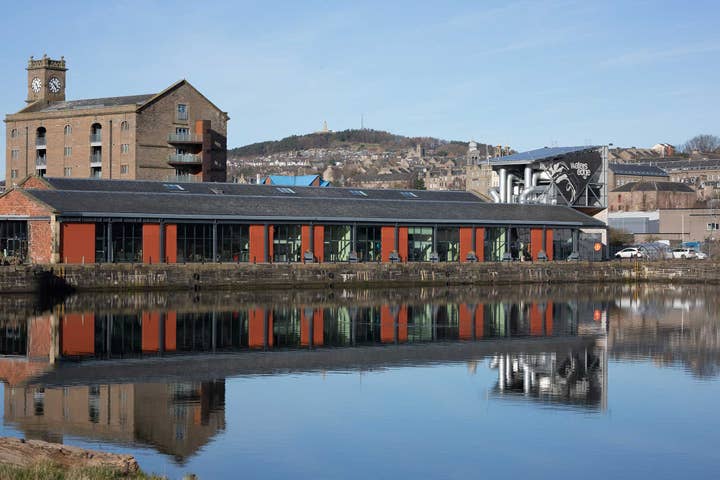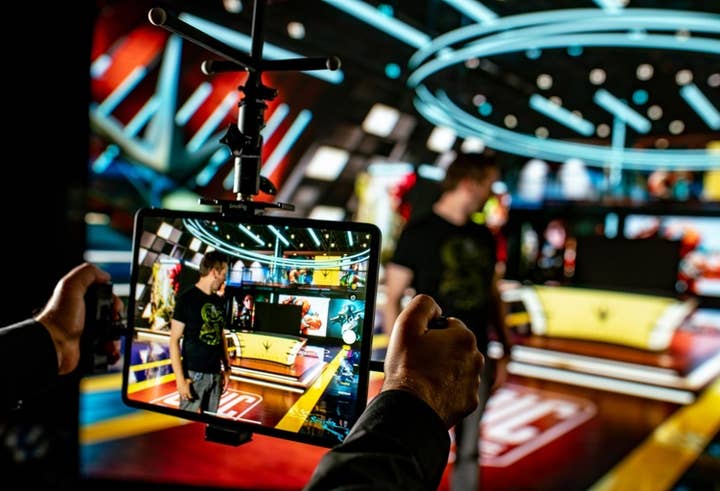This series of Playable Futures articles considers how the design, technology, people, and theory of video games are informing and influencing the wider world. You can find all previous Playable Futures articles here.
The Scottish city of Dundee famously stands as one of the UK’s most significant game industry hubs. There are other hubs, of course, from Brighton to Liverpool via Guildford – but Dundee presents a fascinating and distinct case where the culture of game development has become a part of local culture, and where games’ influence on the city’s wider industry and economy is being felt in particularly profound ways. Considering the future of the Dundee hub’s impact locally beyond games, then, allows us to consider what we might see – or should see – elsewhere across the UK.
Where successful games are made, of course, economies and communities thrive. Earlier this year UKIE reported that the UK game industry supports 76,000 job roles while contributing a significant £6 billion in Gross Value Added (GVA). That amounts to close to double the national average per role. Now, however, something else is happening. The adoption of games technologies to model and manage the delivery of complex systems in new sectors – and the application of game design strategies to create more effective user experiences – is leading to the development of new markets and opportunities for development studios.
“Dundee’s games industry is supporting and fostering all these other local industries, and as a result the economy and skillset”
Gregor White, Abertay University
Before tucking into Dundee as an example of all that, it is worth pausing to reflect on how our industry became established in the Scottish city. That is because, in Dundee, technology and creative culture were a core part of the city’s economy, long before games informed the future under discussion.
“Before the games industry became established in the city, Dundee’s economy was built on manufacturing and electronic engineering, alongside a strong commercial art tradition in comics and greetings cards. As manufacturing went into decline in the 1980s these building blocks underpinned the emergence of the games industry,” explains Gregor White, Professor of Applied Creativity and Director of the CoSTAR Realtime Lab at Abertay University, who led many of the institution’s celebrated game initiatives and programmes.
“In the mid-1980s things were tough here, as they were across the country in that post-industrial era. Dundee wasn’t wealthy, and the city experienced high unemployment, just as you saw across so many post-industrial cities at that time. We had some light engineering at Timex, and at that time, of course, they were making the ZX Spectrum. So, we had light engineering, microelectronics, and we had publishing, of course, and this graphic arts tradition in comics and greetings cards. Dundee needed something new, and these industries were the early foundation for games to flourish.”
It was then that former Timex staffer David Jones, hailing from a group of friends who had been exploring home computers’ together as a hobby, saw that such potential could found local businesses, and in 1987 established DMA Design, the studio behind Lemmings and the original Grand Theft Auto.
“You can really see how games in Dundee are founded on this long history of creative culture locally,” continues Chris van der Kuyl, co-founder and chairman of stalwart Dundee developer 4J Studios. “Within 20 minutes of 4J we’ve got three really solid universities, but it goes a little bit deeper than that, and I think when it comes to Dundee culture, you can’t talk about Dundee without talking about D.C. Thomson.”

Founded in 1905, D.C. Thomson is the iconic print publisher most famed for its comics The Beano, The Dandy, and Commando, which are perhaps Dundee’s most recognised global exports – unless you count Grand Theft Auto.
“Without the impact that publishing empire had on creative arts in the city, I’m not sure how much of what we see in today’s Dundee creative industries would be here,” van der Kuyl continues. “The local story is that D.C. Thomson once bought a new printing machine that could do a third colour on top of black and white, which really set it apart and gave it a lead. It’s amazing when you think of the lasting impact that D.C. Thomson had, and I guess games are the current chapter of that legacy; gaining from the past and shaping the future. Because they covered the comics market so completely, they established this amazing talent production pipeline of writers, creators, artists, and so on, and even into the 1990s we saw some of them moving from comics to Dundee’s game industry.”
That all brings us to today, where Dundee has a bristling community of established and newly formed studios, and a rich seam of creatively diverse local talent. Then there’s that triple threat of Abertay University, University of Dundee, and St. Andrews, all of which have been impressively proactive in engaging with and supporting the game industry. In 2018 the universities and local industry came together to deliver InGAME: Innovation for Games and Media Enterprise, an R&D-led cluster development programme that delivered significant growth and value impact into the local industry. One of the consequences of this investment was to increase levels of innovation in the cluster leading to a more diverse and dynamic games ecosystem in the city.
It is worth noting there, of course, that Abertay has developed a reputation of offering some of the best game courses and initiatives in the world.
“Dundee’s status as a now longstanding game hub has made it very appealing to other sectors, and we’re seeing them not just come here, but thrive like the games sector”
Chris van der Kuyl, 4J Studios
“As for the future, there’s been a watershed for the entire game industry, and that’s the moment Unreal and Unity started to recognise and actively court other industries” states White. “So suddenly we’re calling ‘game engines’ ‘real-time engines’ instead. Real-time technologies are starting to shape film and broadcast and automotive and healthcare and architecture and all these other spaces, and a large proportion of the game industry in Dundee and globally already have this skillset that can be applied in all these new areas. That is a key factor in Dundee’s future as a game industry, but then equally Dundee’s games industry is supporting and fostering all these other local industries, and as a result the economy and skillset. And that’s only going to snowball really, as more companies and industries are attracted to what’s going on.”
“Today we’re at this point when the way games are made overlaps with the production of television and movies and broadcast and all this real-time content appearing everywhere,” offers van der Kuyl. “Dundee’s status as a now longstanding game hub has made it very appealing to other sectors, and we’re seeing them not just come here, but thrive like the games sector.
It is fair to say that Dundee is currently establishing a future-facing ecosystem that will allow the region to truly seize the spillover of game technology and process – with tangible impact. The CoSTAR Realtime Lab which will be based at Water’s Edge is part of a movement that has seen a number of technology parks and incubators established locally. Water’s Edge itself also plays home to 4J Studios, Hutch Games, Stormcloud Games, and a number of other tech-focused companies.

Elsewhere in the city District 10 provides a complex for creative business and start-ups, while the Vision Building hosts the likes of Rockstar North, Tag Games, Hyper Luminal Studio, Outlay Entertainment, and all manner of non-gaming tech and creative organisations. Across those locations, a deliberate intent to foster knowledge and talent sharing between sectors is a common factor, which in turn accelerates the impact of that spillover from games.
Increasingly, for example – served by the amazing local pool of talent and facilities – a sizeable and vibrant broadcast, animation, and TV production ecosystem is emerging in Dundee, as others in the likes of online publishing, healthcare innovation, and learning development also settle on ground prepared by games. Just as Dundee’s publishing and microelectronics background laid the foundations for a globally influential game dev hub, now that sector is doing its bit to assure the future of other industries currently emerging in the Scottish city.
“We’re just at the beginning of this movement too,” concludes van der Kuyl. “Games are helping secure Dundee’s future as a place where education, creativity, technology and innovation thrive.”
And, no doubt, as seen with games, those emerging sectors that move on Dundee will also be embraced as part of local culture and community, feeding into the region’s broader economy, and as such benefiting so many who live there.
Playable Futures is a collection of insights, interviews and articles from global games leaders sharing their visions of where the industry will go next. This article series has been brought to you by GamesIndustry.biz, Ukie, and Diva. You can find previous Playable Futures articles and podcasts here.